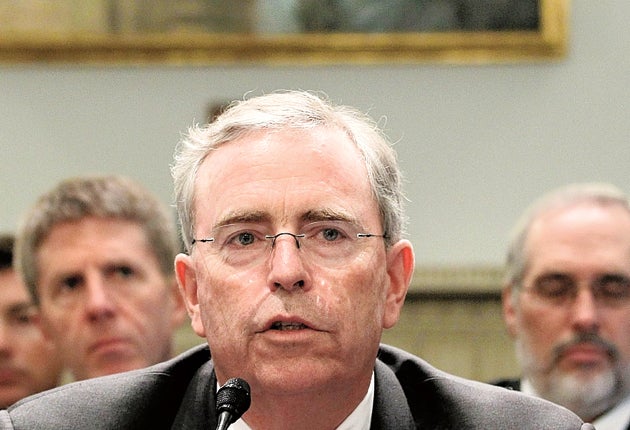Oil spill fallout could pollute the 'special relationship'

The crisis in the Gulf of Mexico is threatening to poison ties between President Barack Obama and David Cameron ahead of their first meeting since the general election.
Even as it made progress in capturing more of the leaking oil, BP was forced to issue a statement underscoring its long-term financial health as it weathers devastating drops in its share value, triggered in part by relentless criticism in America, not least from President Obama.
The pressure being exerted on BP in the US is now certain to top the agenda when Mr Obama meets Mr Cameron on the fringes of a G8 and G20 summit in Ontario, Canada, on 26 June. However, the topic will take centre stage in telephone talks between the two leaders this weekend, British officials indicated. The Prime Minister and President have not spoken since Mr Obama placed a congratulatory call to Mr Cameron after the election.
That the spill could infect the "special relationship" became clear early yesterday when the Mayor of London, Boris Johnson, aired his concerns in a radio interview. "I do think there's something slightly worrying about the anti-British rhetoric that seems to be permeating from America," he said.
"It starts to become a matter of national concern if a great British company is being continually beaten up on the international airwaves."
When Mr Obama said he wanted to know whose "ass to kick" in the Gulf, it was obvious he had BP in mind. BP's shares, which ended 6.7 per cent lower in London, recovered sharply in New York yesterday, but only after plunging by 16 per cent on Wednesday amid fears that the US government was looking for ways to force BP to suspend its dividend payments to shareholders.
Traditionally, BP stock accounts for 12 to 13 per cent of dividend payouts in Britain and many retirement funds depend on it to retain value. "You attack the dividend and you are attacking millions of British pensioners," said Tom Watson, a Labour MP who plans to table a motion in the Commons supporting BP.
In Washington, officials downplayed any diplomatic flap. "I think the British people understand the frustration and anger the American people are seeing in this. It is not going to affect our relationship between the US and Britain," said PJ Crowley, a State Department spokesman. The White House spokesman, Robert Gibbs, also said he did not think the spill would affect ties, adding: "I do not. I see no reason."
Attempting to reassure investors, BP said it was "not aware of any reason which justifies this share price movement". It said it still had "significant capacity and flexibility in dealing with the cost of responding to the incident, the environmental remediation and the payment of legitimate claims".
Yesterday, Mr Obama was due to meet families of the 11 men who died on Deepwater Horizon, the BP oil rig that exploded on 20 April. Among subjects likely to come up at the closed-door meeting were whether families had safety concerns before the blast and what BP did, or did not do, about them. It is partly because of BP's shocking safety record in the US that politicians including Mr Obama feel they can lambast it so energetically.
Mr Cameron acknowledged on his Afghanistan trip that staying out of the BP fray was no longer an option. "This is an environmental catastrophe. BP needs to do everything it can to deal with the situation and the UK Government stands ready to help," he noted. "I completely understand the US government's frustration. The most important thing is to try to mitigate the effects and get to grips with the problem. It's something I will discuss with the President when we next talk."
The US Geological Survey released new estimates for the amount of oil spewing from the bottom of the Gulf of Mexico, greatly increasingly the likely top figure to 50,000 barrels a day. That implies the scope of the damage may still be far greater than feared, and the oil now being captured is well below half of what is still leaking. BP engineers said it was still siphoning roughly 15,000 barrels a day from the ruptured well.
Join our commenting forum
Join thought-provoking conversations, follow other Independent readers and see their replies
Comments